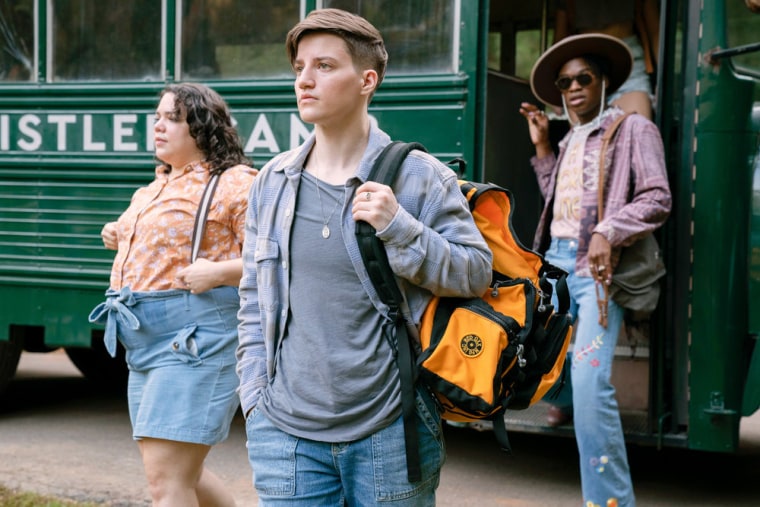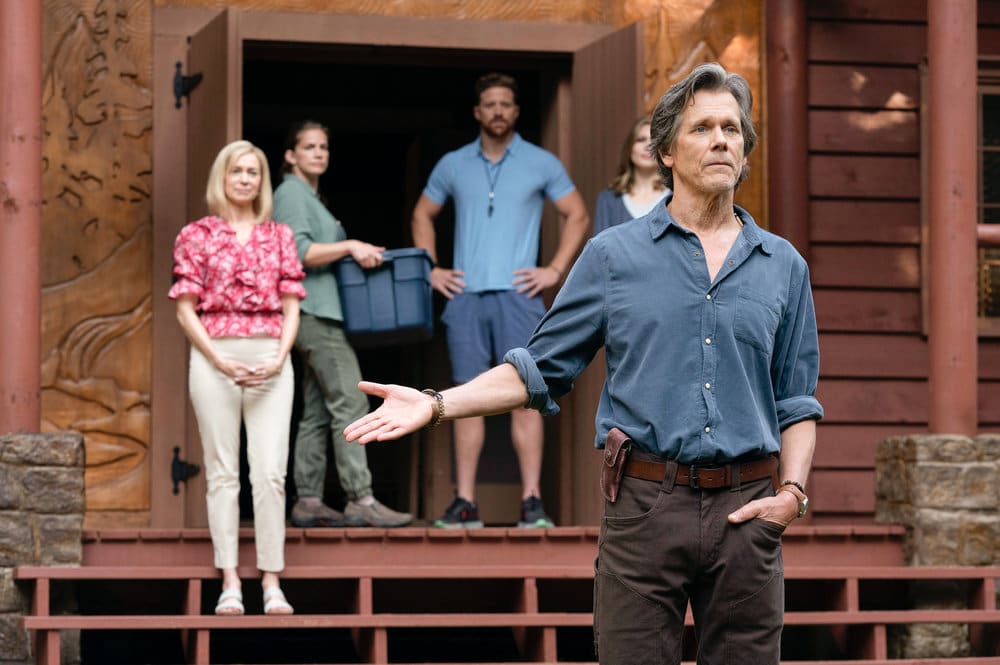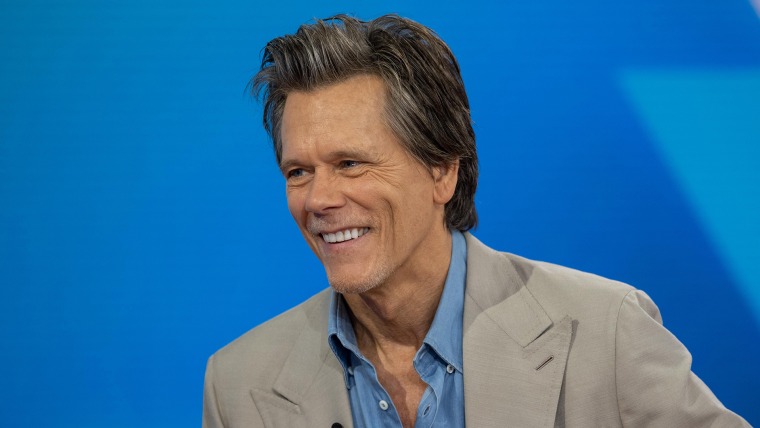John Logan is no stranger to crafting blockbuster films, having written the screenplays for “Gladiator,” “Hugo,” “Skyfall,” “The Aviator” and “Sweeney Todd: The Demon Barber of Fleet Street.” But for his feature directorial debut, the three-time Oscar-nominated screenwriter wanted to pen a love letter to the slasher genre with a set of queer protagonists that his younger self always wanted to see.
“Horror movies have a very complicated relationship with gender and sexual identity, and when I was growing up and watching the first cycle of slasher films, for example, or any horror movies, queer characters were underrepresented,” Logan, 60, told NBC News in a video interview. “They were either invisible, which was horrific in a way, or they were jokes or they were victims, and I know how much it would have meant to me when I was 12, 13, 14 to see a queer hero.”
Produced by Jason Blum of Blumhouse Productions, “They/Them” — which is cleverly pronounced “they-slash-them” and premieres Friday on Peacock — follows a group of LGBTQ campers who are promised “a new sense of freedom” when they arrive at Camp Whistler, a conversion therapy camp run by Owen Whistler (Kevin Bacon), his sadistic therapist wife Cora (Carrie Preston) and a group of suspiciously inviting counselors. But as the workers attempt to break down each of the attendees, a mysterious killer starts claiming unsuspecting victims, and the campers are forced to band together in the fight for survival.

The terrifying premise for “They/Them” had been germinating in Logan’s mind for years, he said, and he wrote two of the roles with specific actors in mind: Bacon as the owner and Brazilian actor Darwin Del Fabro as an enigmatic camper named Gabriel. And while he had not initially considered helming the film, Logan “became very attached” as he wrote the screenplay, “because it was so personal,” and Blum encouraged him to direct it, Logan said.
“Very rarely I write with a particular actor in mind, but the minute I sat down to start writing Owen Whistler, I kept hearing Kevin’s voice,” he explained. “One of the things that Kevin is so adept at is playing nuance. When we first meet Owen Whistler, he seems very sane, very reasonable and charming, and Kevin could charm the birds from the trees, and yet he’s able to also just turn on a moment to have a threat and an aura of danger around him. … He was a great collaborator all the way through.”
A lifelong horror film lover, Logan said he wanted to “celebrate all the tropes” of the slasher genre, including having a secluded camp in the forest, a masked murderer with different ways to kill and a growing sense of dread with heightened stakes for all of the protagonists. But beyond the tone and “physical landscape” of the movie, he wanted to celebrate the seven queer characters — and the actors playing them — whom he describes as “The Magnificent Seven.”
“They’re the ones who are facing down evil, and because they pull together, they’re very empowered,” he said. “So I didn’t have a final girl or a final boy; I had a collection of final heroes.”
Logan noted that the assailant at Camp Whistler, unlike other killers in the genre, “is motivated by something very particular in relation to so-called conversion therapy, and they have a motivation that directly relates to the insidious evil — that is the concept that you can change people’s identity.”
According to a 2019 report from the Williams Institute at the UCLA School of Law, in the U.S. alone, close to 700,000 lesbian, gay, bisexual and transgender adults have been subject to conversion therapy at some point during their lifetime.
After having intimate conversations with survivors of conversion therapy, Logan said he wanted to not only convey the physical duress of the controversial practice — which, as shown in the film, can include shock or aversion therapy — but also “the psychological attack on the kids to try to make them doubt who they were, question who they were and revile who they really were.”
“Everyone I talked to who had been through conversion therapy said [the psychological aspect] was the most insidious and the most horrible part of it — that their very identity was being somehow attacked every single day in different ways,” he recalled. “It was the psychological horror that in a way for them was the most profound, which led to a centerpiece scene in the film where the character of Jordan (Theo Germaine) has a psychological evaluation with the character Cora. … It’s a very long, very quiet scene and, to me, really the most horrific thing in the movie.”
As a middle-aged gay man, Logan knew he would need help to capture the diversity of the LGBTQ community in 2022, namely the struggles that transgender and nonbinary individuals face on a regular basis. He worked closely with Scott Schofield, a senior consultant at GLAAD who became involved in the nascent stages of the project as an executive producer, and actors Germaine and Quei Tann to develop a better understanding of the modern politics of sexuality and gender identity.
In addition to speaking with the cast and crew about sensitivity issues, such as what pronoun and what bathroom to use, Schofield was “incredibly helpful with me in terms of working through the intimacy scenes, because there are some sort of romantic and sexual situations in the movie [where] I wanted to make sure we were treating the actors with the utmost respect, and they felt their voices were being heard,” Logan said. “But Scott was there every day, and I turned to him constantly in terms of, ‘Are we getting this right? Are we saying this right? What are the concerns that I don’t know about?’”
For Logan, “They/Them” is meant “to be a celebration of all parts of the queer experience,” including sexuality, romance and the general “exuberance of the queer experience.” The film contains multiple intimate scenes, which were crafted to show “how queer people interact erotically — the same way you’ve seen straight people interact erotically for your entire life on screen,” he said.
“One of the romantic scenes is very romantic: You’re sitting on a dock, the sun is beautiful, and these two characters come together after the entire movie to sort of celebrate a newfound love, so we always approach that very romantically,” he explained. “One of the other romantic scenes is very erotic, it’s very powerful. It’s sort of a primal connection between two of the characters, so in a way, it was trying to grapple with all the different forms of romantic erotic expression and exuberance that can happen — to do it in a joyous way, but also an honest way.”
That joy is particularly palpable in an early bonding scene at the cabins, when the campers sing “F—–’ Perfect” by P!nk, who signed off on the use of the song in the film. In many ways, “it was the perfect song,” Logan quipped. “P!nk is a huge LGBTQ+ advocate, so it seemed very appropriate that at Jordan’s lowest moment, that song is the song that brings them back to this feeling of empowerment. In fact, it’s the moment where all these disparate characters come together to become one family, if you will.”
The song also makes a reappearance at the end of the film, when the surviving campers are left to their own devices the morning after the killer has been unmasked.
“I think character growth or human growth comes through the crucible of conflict,” Logan said. “We emerge better human beings when we’ve been tested in some way, and the characters in this movie are severely tested both psychologically and physically in terms of the dread and horror of this camp, and they emerge from it unified, proud, strong and brave. … I hope it’s a very entertaining horror movie for general audiences, but there’s that other meaning to it — which is, if you know queer people in your life, celebrate them.”
Having written and produced a diverse array of stories for the stage and the screen in the last four decades, Logan noted that the significant strides in LGBTQ representation have made this the right moment for a film like “They/Them,” which likely would not have been the case five to 10 years ago.
When he made movies like “Any Given Sunday” in 1999, “queer characters just weren’t represented in mainstream Hollywood movies at all. Or if they were, it was in a romantic comedy as the gay best friend or the lesbian best friend,” Logan said. “But gradually over the years, we’ve been able to push those doors open toward queer characters.”
“For me personally, a big sign of that was ‘Skyfall,’ when Javier Bardem has his first scene with Dan Craig, and we deal with homoerotic seduction,” he continued. “And I must say the people, the Bond universe, for example, were very excited about that — as was [director] Sam Mendes, in terms of saying, ‘Yes, this is modern. Now we can represent characters in a complex, interesting way. They aren’t always the best friend, the victim or the joke; they can be complicated characters as well.’ And that’s just increased more and more and more to the point where a movie like ‘They/Them’ can fully embrace those characters in all their complexity.”
“They/Them” is now streaming on Peacock (NBC News and Peacock are both owned by NBCUniversal).
Follow NBC Out on Twitter, Facebook & Instagram.
Source: | This article originally belongs to Nbcnews.com










